Making digital count

Baker Self Adhesive Labels used its recent HP Indigo-sponsored Open House to demonstrate a one-stop-shop for all things digital – from trade printing services to supply of coated and custom slit reels. Carol Houghton reports
In 1993, Benny Landa, founder of HP Indigo, said: ‘Everything that can become digital, will become digital. And printing is no exception’. Baker Labels became the first UK operation to invest in HP Indigo’s WS6000 digital press in 2009. ‘We are proud of what we do and we do it well, which is why we are hosting the day,’ says Steve Baker, managing director of Baker Self Adhesive Labels. ‘We are very open and honest and visitors appreciate that.’
History
Roy and Marian Baker founded Baker Self Adhesive Labels in 1973 in Kings Cross, London, where they established and built up the business, specializing in flat screen, hot foil and sheet fed printing. The company – now run by their son, Steve Baker, from a new facility in Essex – serves a range of customers, from large international companies to small businesses. Among the 46 employees many have been with the company for over 10 years, a great source of pride to Steve Baker.
Today, 60 percent of Baker Label’s six million pound turnover is generated through label sales, the remaining 40 percent is made up from selling raw materials to other label printers – Bakers is an official distributor of Fasson products plus a stockist of all the other major suppliers. Of the label sales figure, 60 percent is digital. On the decision to purchase the WS6000, Baker explains: ‘Five years ago the choice was between Xeikon and HP. We believed HP offered the best quality and widest choice of substrate.’ A large percentage of orders were less than 1,500 meter runs and the company wanted to reduce changeover between jobs as conventional origination costs were having a negative effect on smaller orders.
The company has been able to reduce stock through its digital printing investment. It takes an average of 250 orders a month, and material costs are less than 20 percent of turnover in the digital operation.
Baker also notes that the company has experienced a change in the ratio of admin to printing staff since going digital, ‘The mix is now 50 – 50 and the emphasis in the production is more on specialist finishing than the actual printing.’
Bakers digital business covers a lot of bases. It offers a materials coating service for other HP press users; acting as a ‘contingency supplier’, providing back up for digital converters who require temporary additional capacity; and it does digital trade work for converters who do not currently have their own press. ‘Customers can use us as a trade partner to develop their business through us to try digital. When the investment pays off, they can take business back themselves,’ says Steve Baker.
Nick Theobald, representing Denny Bros at the Open Day, believes that Baker Labels has developed an interesting niche in the market, selling ready coated and slit materials for short run digital printing so companies like Denny Bros do not have to buy, coat and slit their own master rolls.
Summing up, Steve Baker confirms that digital has ‘massively changed’ his company’s business. ‘2010 was a record year for us and our turnover speaks volumes in what has been a bad year for a lot of companies,’ says Baker. The digital part of the business has grown at a rate of 20 percent year-on-year, but Baker expects flatter growth this year as more companies take up digital. Indeed, Baker believes that the profit margins on digital label converting might already have peaked and companies will need to reinvest and find the new ‘next big thing’ to keep the business successful.
The open house
Visitors to the Open House saw various live demonstrations: the WS6000 printing on 50 micron shrink film, 450 micron board and a 60 micron film. Press operator Richard Stokes comments, ‘As long as pre-press do their job, it is a dream to run. Wasteage is five meters, if that.’ Stokes says the press needs to be well maintained, and HP provide ‘good quick service and support.’
One of the highlights from the event was the WS6000 printing on a 12 micron film. Tony Bell, AB Graphics International, comments, ‘What the press can do forces us to do more on the finishing side.’ ABG demonstrated both a Digicon 2 and short run carton cut/crease unit.
Other technologies on show included EskoArtwork’s Automation Engine 10. The EskoArtwork technology was installed a couple of weeks prior to the event and chosen to ease job throughput, increase capacity and profitability. The ability to preset repetitive tasks and make automated decisions within the workflow eliminates errors and saves time and money, as Steve Baker explains, ‘We wanted EskoArtwork to be involved because while we have been working with them for a number of years we have just decided to invest in Automation Engine. We chose the technology because runs are getting smaller and variants increasing, which meant administration of jobs such as preflighting and proofing was taking up more time. We wanted to reduce that.’
Pictured: Steve Baker watches the live demo with customers
This article was published in L&L issue 1, 2012
Stay up to date
Subscribe to the free Label News newsletter and receive the latest content every week. We'll never share your email address.
